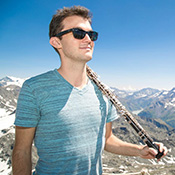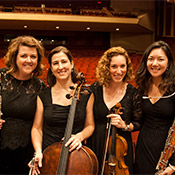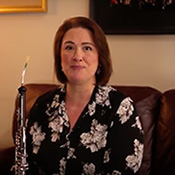
Katherine Young Steele: Music, Education, and Fostering Growth
DAVID LEWELLEN
PUBLISHED
Tagged Under: MSO Musicians, Musician, Oboe
From the beginning, music performance and education have twined together in Katherine Young Steele’s life.
As a child, she always heard music lessons going on in her home, since her parents were both music teachers. In fifth grade, her first choice of instrument was the trumpet, “something loud, like my dad did.” But her pre-orthodontic teeth made the instrument difficult to play (as her parents suspected), and her second choice, the oboe, was easier. She didn’t necessarily intend to become a professional oboist, but “I worked really hard, and I’ve been lucky to be in situations that led me to the next step.” Those steps led her in 2012 to her current job as principal oboe of the Milwaukee Symphony
Growing up in Lancaster, Ohio, she was usually the only oboe player in her school bands. Her parents signed her up for lessons with Donna Conaty at Ohio University, an hour away, and “it was the best thing that could have happened to me,” Steele says now. She would do her homework in the back seat with a flashlight while a parent drove the winding roads to Athens. “I was very fortunate to have parents who made that happen,” she said, “and a teacher who realized I was worth teaching.”
As an undergraduate at Eastman, the elite music school in Rochester, New York, she was “surrounded by people who could play, a supportive environment, driven by our own high standards.” But she also got a music education degree, and that department helped her “pair excellent playing with the ability to teach.”
Music conservatories do not offer classes on how to give an effective private lesson, even for students on the education track, but Steele has some opinions: “First of all, you have to play the instrument well. And you have to have experience with auditioning and stress and success and failure. I’m a better teacher the longer I perform and the more students I’ve had. Every student goes into the mental folder of experiences I’ve had.”
Steele gets irritated when she sees music education programs turning out band directors who are not proficient on an instrument. “They should at least be playing in their wind ensemble,” she said. “It drives me crazy.” But she thinks the same about conductors who lead the MSO and other top-level groups.
And Edo de Waart, the MSO’s music director laureate, who hired Steele, is a former professional oboist himself. But that didn’t put any extra stress on the audition, she said. The European oboe sound is different from the American school, but “I knew he liked artistic, expressive playing, and that’s what I do anyway.” It’s particularly important in the principal seat, “being a singer at all times and being a leader. It felt good knowing I had his support and appreciation.”
“Katie listens to and appreciates really good singers,” said Kevin Pearl, the MSO’s assistant principal oboist, “and there’s a vocal quality to her playing, but she has incredible control of her instrument.” Sitting next to her, he said, is “both fun and musically rewarding. She always makes everyone feel welcome, especially substitutes. She makes us feel we’re in this together as a team, which is a wonderful quality in a principal player.”
Steele performed Richard Strauss’ Oboe Concerto with the MSO in 2015, and the experience of preparing it with de Waart, “I’ll never recreate that with another musician ever again,” she said. “He knew exactly where I was going to breathe.”
The symphony approached her about the concerto shortly after she found out she was pregnant with her first child, and the performances happened when her son was six months old. She and her husband, John, now have two boys and live in Glendale. John Steele travels a lot for his job, but Katie says with a shrug, “Every family with young kids figures out how to make it work.” Having toddlers in the house, she said, has made her a better reed maker – because she can’t leave the sharp tools lying around, her time is much more focused. “When you have five minutes to yourself, it’s the most productive five minutes you ever had.”
When she teaches oboe students, “I want them not only to play the oboe better, but to be good citizens, part of the community. I’m trying to foster growth at every level.” And the same thing is important for music education in the schools, she said – a good band director is “grooming young people to be better human beings, not just better musicians.” Far beyond the trophy case, “the best teachers realize a kid may never touch the baritone horn after high school, but they’ll be more well-rounded.”
And in that respect, she says, what she has seen in Milwaukee is a model. “It’s a big selling point for a lot of us. The school programs are great. MYSO is an opportunity. There are a lot of things to be proud of.”



